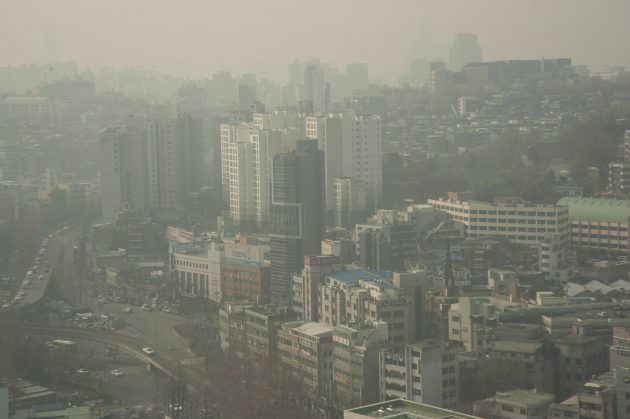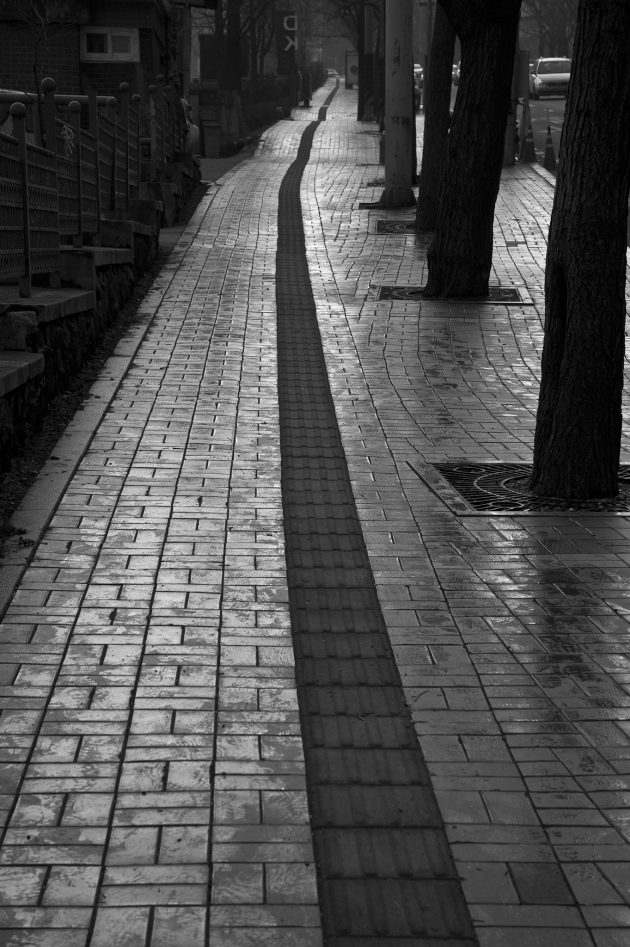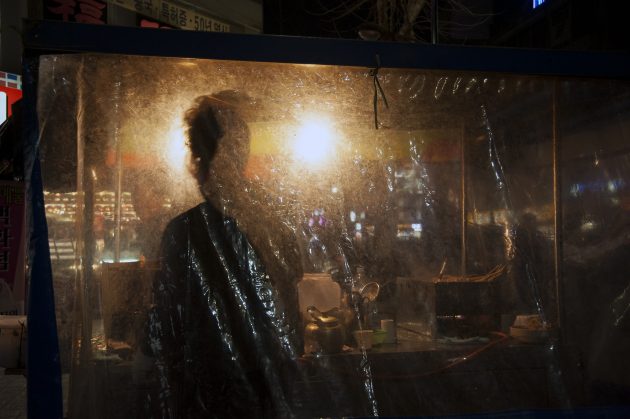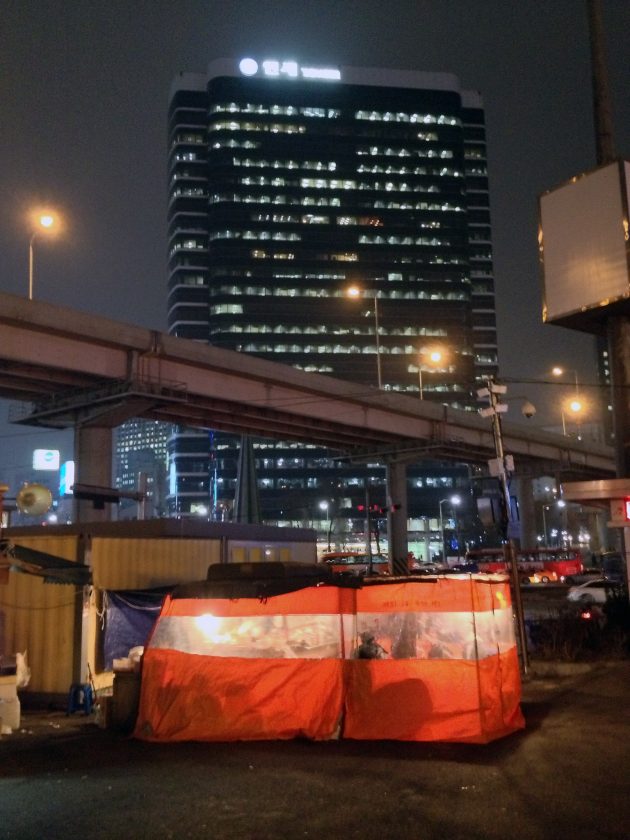
I make my living as a photographer. Mostly ads with models holding steaming cups of coffee or vacuum cleaners. I don’t pretend it’s art. Others do. I don’t. I was far enough along in my career to try my steady hands at an artful collection for a small gallery in Hongdae. But that day, another terrible hangover lingered and I hadn’t done a bit of work. The collection was going to be Painters at Work. Alone, with my head throbbing, crippled on the couch, I stared up at the water stained ceiling wondering how the hell I would finish my final subject: the slouched body of Suhan, the painter who painted seascapes on canvas and sold them from the steps of Seoul station.
Watching painters work was something I’ve always been drawn to. How they licked their lips. How their eyes never seemed to blink. How they paced alone in cluttered rooms, stared at things as if defusing bombs, and every breath was a hiccup from boom. When I watched them, I waited for that moment when everything was framed just right and they held their breath at that unspeakable moment of clarity. That’s when I’d snap. Seeing them in that way, for me, was diving into their minds. And when they looked back at me, hovered over the screen of what I had just captured, our eyes would meet and I felt them diving into mine. Like we were tethered. Like we had done it together. We had made art.

Suhan’s eyes always felt as though she didn’t see me. Our gazes would meet but there was no shared secret between us, no smirk of appreciation. It made me nervous. Every photo of her looked like that too: a little out of focus, the exposure slightly dark.
At five, just as the evening traffic stuffed the ring roads of Seoul, and everyone mashed together on the subway cars, I gathered my things and went to the station. The sun would set around seven. Under the colors of magic hour when all the colors mixed and blended together, I would catch the perfect shot.

The station walls were glass. It didn’t gleam. Black dust from the rains dimmed the sloping walls a mold-stained cobalt. Seoul Station stood on top of granite stairs with an escalator tube on one side and a granite department store wall on the other. Suhan sat cross-legged at the top of the stairs leading to the doors. Slouched, she painted deadly-looking rocks and waves crashing into them. In a neat row on the blanket she shared, the day’s work dried. Commuters passed her. Tourists stopped for a second to see and ask politely what she was painting. She’d point to the small drying canvases and the tourists would lose interest and scan the road for taxis.
All her paintings were of the ocean. White caps of green and blue water bent under the weight of gray sky. Most had the ragged rocks and steel bones of wrecked ships eroded by the waves. There was little hesitation in her strokes, almost thoughtless. Painless. And every shot I took looked rushed, plain, dead. Perfect banners for weekend art schools advertising a two-for-one deal, but not art.
Every ten or fifteen minutes she would sit up, stretch her arms and neck and after a breath bend back down to the canvas. After one of these stretching sessions she called to me as I sat on a lower step rubbing my head.
“I can smell you from here,” she said.
“I showered,” I said, looking up. The sky hadn’t turned yet. I needed colors, anything but blue and gray and black mold.
“You drink too much,” she said looking down at the waves.
Through the viewfinder I took a couple of shots of her sitting before her painting. Each shot heartless, each to be deleted on the way home. “I’ve got reasons,” I said.
She sat up again and looked to the homeless men lined up by the ashtrays near the entrance to the station. They begged for change or a smoke. No one gave them a look or said a word. When the smokers walked away, the homeless men—one by one, careful not to get in each other’s way—searched the ashtrays for half smoked cigarettes.
“Reasons,” she said, and bent back down to her painting of the ocean.
All around us, the moving wall of men and women leaving work pounded the granite and bumped into each other. I took a few photos of their black pants, black leggings, and black shoes. When I was in college I spent a lot of time on faces in crowds. Now, portraits in the crowds left me feeling depressed. All these people marching back and forth from work to home without smiles or frowns, their eyes watching the ground or their phones, not wishing to see anything. If I could dive into their minds, I felt that I would just see a straight line that their feet traced to a cliff that fell into a black hole.
After a few more shots I looked back up to the sky and waited for the ashen blue and the dull polluted clouds to burn with color. Suhan kept her eyes down, painting the ocean that was nowhere near.
When the sky finally began to change, I moved and tried to snap low angle shots. Her black silhouette cutting the tea rose clouds. Reflections of the carmine from the glass walls matted through her black hair. Colors were what I looked for: beating against the sheen of oil paint, crashing rainbows off the glass paint jars, colors. But as the sky darkened and Suhan packed up, I knew whatever I had hoped to see didn’t happen, didn’t connect, leaving me with a SIM card full of colorful pieces of trash.
“Would you like to get a coffee?” she asked.
I stared at the LCD screen of the camera and sighed. “Beer?”
“Coffee.”

It was only eight. But in the dark alleys behind the station there wasn’t a soul. Around each corner was the same. Nothing moved but the cool April wind. I had often felt alone in Seoul, going days without sharing a glance with anyone on the streets but here felt like scorched wilderness. Under one streetlight was a coffee machine. Suhan stopped.
“Regular or milk coffee?” she said.
“Serious?”
“I’ll buy.”
“No café?”
She put some change into the machine. A cup dropped and the machine whirred. “In Spanish, café means coffee.”
“Milk then.”
She handed me the paper cup, “Did you get what you were hoping for?”
“Well,” I took a sip. “I haven’t had instant coffee in years.”
“The photographs.”
“Oh,” I thought of lying. I watched her as she took her paper cup with both hands and closed her eyes and sipped. The way she drank was the same way I coached models to. Pretend it’s comfort in a cup, I’d say in soft tones. Pretend someone is holding you as you drink.
“Not really,” I said.
“Yeah, I figured.”
“The light, the frame just hasn’t been right, yet.” The coffee tasted syrupy. “You know how it is.”
“I used to drink a lot,” she said and opened her eyes. “I used to drink all night when I wanted to forget.”
“What did you want to forget?”
She smiled. It was the first time I had seen her smile, and it wasn’t the smile of an artist. Those smiles always seemed pained except for the moment when something was finished—more relief than joy. Her smile showed teeth.
“I don’t know, I forgot,” she said.
“Dean Martin, right?”
“Artists steal, don’t we?”
“Yeah, but aren’t we trying to hold a mirror to reality?” Even as the words dropped out of my mouth, it sounded canned and rehearsed.
“Really?” she said.
“Yeah,” I said, avoiding her gaze and her smile. Somewhere off in the dark a stray howled. We were walking again and I tried to say something smart. “We are all seeking that moment, that perfect moment when it tells us exactly how the world is.”
“How’s that working for you?” she asked.
“You don’t do small talk, do you?”
“Answer mine and I’ll answer yours.”
After a long sigh I said, “It usually works.”
“Really?”
“Yeah. There’s always a moment when the framing is right and it tells the whole story and you feel part of it. You just have to wait for it. That’s what people pay me for, finding that moment and selling it. Someday I hope someone will want to put my stuff up in their office to make them look cultured.”
“I like that, cultured.”

We were out of the alleys and on a road. There was a fried chicken bar across the street with tables set outside and it killed the quiet. Beer glasses clinked, the voices rumbled and scooters and cars roared past.
“I live for a photo that brands itself behind my eyelids. Close your eyes and it’s there,” I said.
“When does it leave?” she said.
“What do you mean?”
“The brand.”
“I don’t know,” I thought of all the photos I had taken, but suddenly I couldn’t think of any. “I guess that’s why I keep doing it.”
We kept walking. Wedged between the glass office buildings and the cars passing us, under the swaying pruned branches of trees, we walked the straightest road in Seoul. At the end of it, far off and dark, lit only by a string of white lights of a snaking road, a mountain loomed.
It was framed perfectly.
“What did you try to forget?” I asked.
“The ocean.”
“You lost someone, right?”
“I did. But you can’t really lose someone just like you can’t really have someone. I don’t know, it’s just, the ocean. You know? It’s complicated.”
“So, why paint something you want to forget?”
Suddenly, there was a crack. Thousands and thousands of firecrackers, or branches, or peanut shells, or bones, something brittle and many broke to pieces and shattered the air. And then the lights from the office buildings, the streetlights, every bright spot from where we stood all the way to the mountain went out. The city was dark.
I blinked. It was all black with my eyes open or closed. The sky above, with its constant haze of orange city light, now black as ink.
“What happened?” I said, trying to breathe, fighting the sensation of something clenching my throat.
“I don’t know,” she said. I felt her hand on my arm. “Look up in the sky.”
“Look up at the sky?”
“Do it,” she said. “What do you see?”
“You don’t think it’s an attack do you?”
“Is that what you see?”
“A power outage? Solar flare?”
“What do you see?”
I looked up and saw nothing, absolutely nothing. I heard shouts of people, the crashes of glass breaking on concrete, the flutter of birds, the sound of wind against the branches. But I couldn’t see it, couldn’t frame it, couldn’t imagine it. As if the world had always been dark and I and everyone and every color, and every other moment before now had drowned.
Then I saw it: torn between the clouds were pinpricks of stars in the cloth of sky. And I felt the space that stretched between the specks of light straighter and longer than anything I had ever seen. So black, so heavy, so empty, so vast, terrifying. It knew nothing of me. I knew nothing of it.
I reached for my camera but suddenly my hand clasped onto hers. Her hand was cool as rock and slick with sweat. And then, as I looked harder, I saw that there were millions of them: the stars. Faint, yet there in the curtain of matte black sky. Each with its own color, each so alone and never touching, so clear, so far apart, yet so many, everywhere. Perfect.
“It’s…” I said.
“Only this,” she said. “Only this and nothing else.”
I breathed and I heard her breathing too.
“Yeah,” I said.
“I know,” she said. “I know.”
